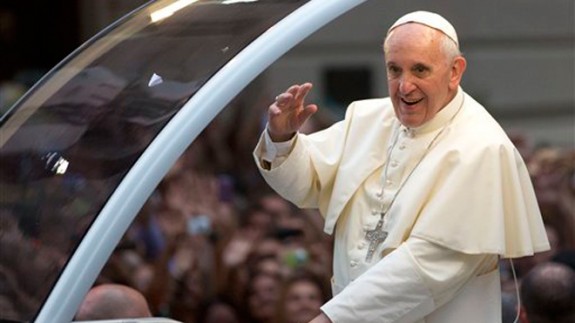That’s one of the questions Michael Sean Winters poses in this rejoinder to Archbishop Chaput’s comments yesterday in the National Catholic Reporter.
Pastors around the world are reporting increased levels of Mass attendance and more frequent reception of the sacrament of reconciliation. Is this not what conservative Catholics have been calling for these past few decades?
There are numerous reports from Brazil this week, man- and woman-on-the-street interviews with people, especially young people, who were previously alienated from the church but are now giving her a second look. All of them cite something Pope Francis said or did as the reason for their renewed interest. (Kudos to my old friend Miguel Marquez at CNN for a wonderful story on the excitement Pope Francis is generating in Brazil.) Is not this renewed interest in the church precisely what the new evangelization aimed to achieve?
Why, then, would conservative Catholics be so upset? If what they wanted all along is coming to fruition, why the long faces? The answer is simple, and Archbishop Chaput’s guarded, even grudging, comments about Pope Francis point us to the reason: Pope Francis, within a matter of months, has destroyed the prevailing narratives about secularization and Catholic identity among Catholic conservatives, and he has done so without even trying.
Pope Francis does not speak about a “smaller, purer church.” There is not a Jansenist bone in his body. He certainly calls, almost daily, for a purer church, for one filled with Christians who are energized by their faith, and he certainly encourages all Catholics to avoid the temptation to be “part-time Christians.” But the purer church of which Francis speaks is not smaller; it is not an elite consisting of those who are rock solid against same-sex marriage. It is a church in which everyone is trying to become a better Christian, to focus more intensely on the Lord’s promises, especially his promise of mercy. Francis does not focus on the sin of men; he focuses on the mercy of God. Consequently, his call to conversion of heart is encountered not as a chastisement, not as a finger-wagging exercise, but as an encouragement. It helps, too, that Pope Francis always includes himself and the clergy in this call to conversion.
Pope Francis does not present himself as a culture warrior, though some of his remarks about economic realities are quite trenchant. You cannot mistake him for a politician. He never speaks as if he just got off the phone with Professor Robert George or Mr. George Weigel and is parroting their talking points. Pope Francis seems to have internalized an observation made by Cardinal Francis George that, in order to evangelize a culture, you must first love that culture, an observation that Cardinal George wrote but has been unable to get his conservative intellectual friends to grasp.












